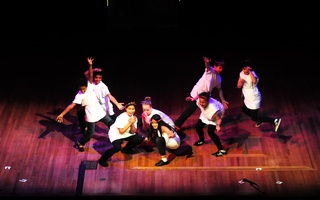By the way, a few have disagreed with the theory that the comp is the ultimate vehicle for making the most of opportunities in Harvard life. "It's the classes that are really stimulating," one said. "I meet so many people at parties!" said another. But these misguided souls graduated several years ago.
So I decided to live my first year at Harvard as a perpetual comper. The Independent, Crimson, WHRB, theater groups and many others. I was constantly trying out things, testing these groups and keeping myself from falling into niches at the same time, seeing what I liked and how I fit.
My biggest extracurricular decision came early in the year. Sunday night was the night of conflict. That was the night when the Undergraduate Council, Harvard's student government, met, but it was also the same night CityStep met. I had to decide whether to run for the council or try out for CityStep.
The council would be the expected thing to do, a logical continuation of high school. It would also be most appropriate, or so Dad's argument went, for someone considering a distinguished career in government. But college isn't really the time to be distinguished.
I thought back to high school, when I was a fairly typical extracurricular jock. Newspaper, student council, blah-blah-blah. All standard fare. I was sick of it by the end of senior year: sick of running meetings, sick of organizing committees, sick of calling people foractivities.
It was time, or so L figured, to do something different, something unlike what I'll probably be doing in 20 years. It was time to challenge myself with something new--which is where CityStep came in.
Now here was something different--teaching fifth graders about dance-theater Harvard students venture into Cambridge schools, get kids to express themselves and put on a show at the end of the year. Here was a challenge--especially for someone whose primary dance experience consisted of tap lessons at the age of six.
Their introductory meeting had a video--big plus. City Step looked fun: nice people, cute kids, no real dance knowledge required. What the hell?
So I decided to try out, which was pretty darn terrifying. This was the one tough tryout. They taught us a series of steps which we were supposed to remember and actually perform. Like true dancers! With expression! And energy! I figured that if I remembered most of the steps, I would be lucky. Looking back, I realize I used much more concentration for these auditions than for any exam I've taken at this place.
At the auditions, people joked around. It was supposed to be kind of fun. We were dancing and playing improvisational theater games. But I was all business. One woman I later taught with said to me later in the year, "Jason, I like you a lot and everything, but I thought you were such an uptight little prick in tryouts." No matter. I was determined to make it and needed to make sure my rightful didn't become to attracted to my left.
Well, I didn't trip or forget too much, and I was rewarded with a spot in the company. It seems that being a male can sometimes have affirmative action value after all.
Each week, I looked forward to Sunday night, when we learned the big dance numbers to the sounds of Janet Jackson or Queen Latifah. Typically, I forgot the steps (or simply couldn't do them), and would fall hopelessly behind the rest of the group. Luckily, I had a partner in crime, Seth, who had similar trouble entering into the world of dancing Wemade fun of our ineptitude while talking sports from the safety of the back row.
I was also fortunate to have a devoted director who was willing to stay with me after rehearsal and go over the steps at my slower pace. "You want me to iump. Kick and land how." I would ask her. She would just smile and show me the step again for the umpteenth time.
I learned from the rehearsals that there were some great upperclass students out there. That you can do anything if you work hard enough (see Horatio Alger, Ross Perot and the American dream). If I can pass for a dancer on a Sanders theatre stage, anyone can.
Then, of course, there was the actual teaching. What a sham. The idea that someone who could barely remember dance steps for himself could teach others went beyond the bounds of reason. But I employed some nice, twisted logic to justify my presence. I figured that the kids could look at me and say, "Well, if he can do these dances, then certainly I can do it. I mean, I can't look any dumber than he looks." I fancied myself a martyr of sorts--letting myself look bad to boost the self-esteem of the young people of Cambridge.
Read more in News
GSAS Dean Finalist for Position at VirginiaRecommended Articles
-
1400 Attend Ball, But Have Trouble Getting HomeAlmost a quarter of Harvard's undergraduate population got in touch with their inner child on Saturday evening at the Children's
-
1992 CANDIDATES FOR HARVARD & RADCLIFFE CLASS MARSHALSBert Adams Winthrop House Crimson Key Society Marshal's Office Coordinator, Freshman Parents' Weekend Organizer; Harvard Sailing Team; Memorial Church Usher,
-
Harvard Troupe Visits Local SchoolsNext February, up to 125 students from Cambridge schools will join a troupe of Harvard performers in Sanders Theater to
-
 CityStep Selling Good Luck Grams During Reading Period
CityStep Selling Good Luck Grams During Reading Period -
 Nina M. Yancy
Nina M. Yancy -
 At 30 Years, CityStep Flashes Back in Annual Performance
At 30 Years, CityStep Flashes Back in Annual Performance













